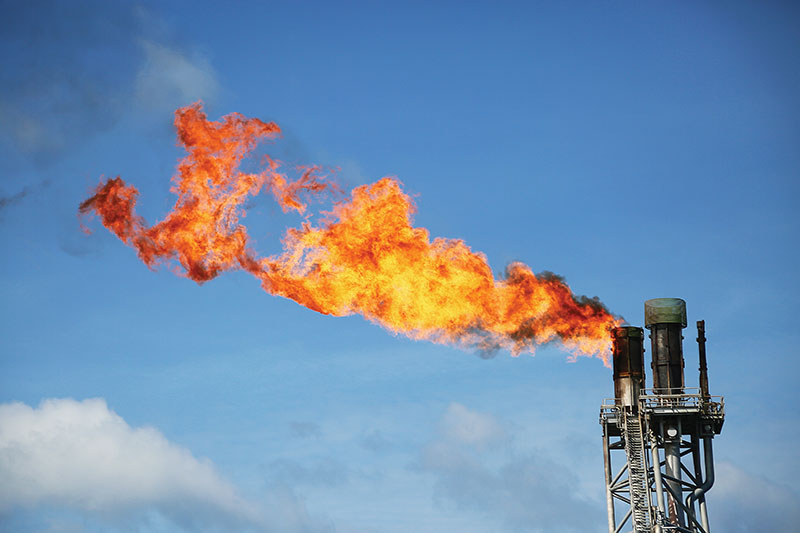Texas Oil Operators Increase Flaring Amid Weak Gas Prices
(Reuters) — Operators drilling for oil in Texas are scrambling to dispose of their excess natural gas amid a supply glut and weak prices, prompting an uptick in flaring requests.
The Railroad Commission of Texas (RRC), which regulates the state's oil and natural gas industry, last week approved 21 exemption requests from operators, mostly in the Permian and Eagle Ford shale fields, to flare, more than four times the level it approved this time last year.
Flaring, the burning of unwanted gas, has come under greater regulatory scrutiny in recent times as environmental groups and climate activists seek to clamp down on the practice that releases greenhouse gases.
Producers, however, now face a dilemma with crude oil prices CLc1trading above $80 a barrel, but gas remaining depressed and, in some places, falling into negative territory.
"We think that operators will basically use all the tools in their toolbox to try and keep producing oil because the oil returns are pretty strong right now", said Jason Feit, advisor to energy data provider Enverus.
"Flaring is becoming more challenging everywhere, so I think that is something they are probably not wanting to do, but it would be preferable to shutting in any wells for sure", he added.
Operators can seek an exemption from Texas' flaring rule for safety reasons, maintenance, or emergencies, and during the first 10 days of production when bringing on a new well, the RRC said.
Devon Energy requested 12 of those exemptions for its operations in the Eagle Ford in south Texas, while Callon, which was acquired by Apache in early April, made six request for assets in the Permian. All of those were approved.
"As we integrate the recently acquired Callon assets, we are working to get our arms around how we can efficiently move to a similar standard on these new assets. This will take some time, but we are committed to safe and responsible operations throughout this process”, an Apache spokesperson said.
Devon declined to comment.
Gas prices in many states, including Texas, have traded below zero several times over the past month or so due to low demand, ample renewable power supplies and pipeline outages and other work that has trapped gas in the country's top oil producing state.
Spot natural gas at the Houston Ship Channel NG-PHSC-TX-SNL in Texas, the price the industry uses for the Eagle Ford, have averaged $1.68 per million British thermal units (MMBtu) so far this year, according to SNL Energy data on the LSEG terminal.
That compares with an average $2.26 per MMBtu in 2023 and $4.07 per MMBtu over the five year period from 2018 to 2022.
Meanwhile, prices at the Waha hub NG-WAH-WTX-SNL in west Texas closed as low as negative $2.99 per MMBtu in mid-April, its lowest since December 2022, according to data from LSEG, meaning operators must pay to have their gas taken away.
While Waha prices have recovered some, they remain depressed.
The supply of associated gas is not likely to subside soon, as more producers continue to chase profitable barrels of oil in the Permian.
Permian gas output is forecast to rise by 140 million cubic feet per day to 25.2 billion cubic feet per day next month, according to the Energy Information Administration (EIA).
Related News
Related News

- Kinder Morgan Proposes 290-Mile Gas Pipeline Expansion Spanning Three States
- Enbridge Plans 86-Mile Pipeline Expansion, Bringing 850 Workers to Northern B.C.
- Intensity, Rainbow Energy to Build 344-Mile Gas Pipeline Across North Dakota
- Tallgrass to Build New Permian-to-Rockies Pipeline, Targets 2028 Startup with 2.4 Bcf Capacity
- U.S. Moves to Block Enterprise Products’ Exports to China Over Security Risk
- U.S. Pipeline Expansion to Add 99 Bcf/d, Mostly for LNG Export, Report Finds
- A Systematic Approach To Ensuring Pipeline Integrity
- 275-Mile Texas-to-Oklahoma Gas Pipeline Enters Open Season
- LNG Canada Start-Up Fails to Lift Gas Prices Amid Supply Glut
- TC Energy’s North Baja Pipeline Expansion Brings Mexico Closer to LNG Exports





Comments